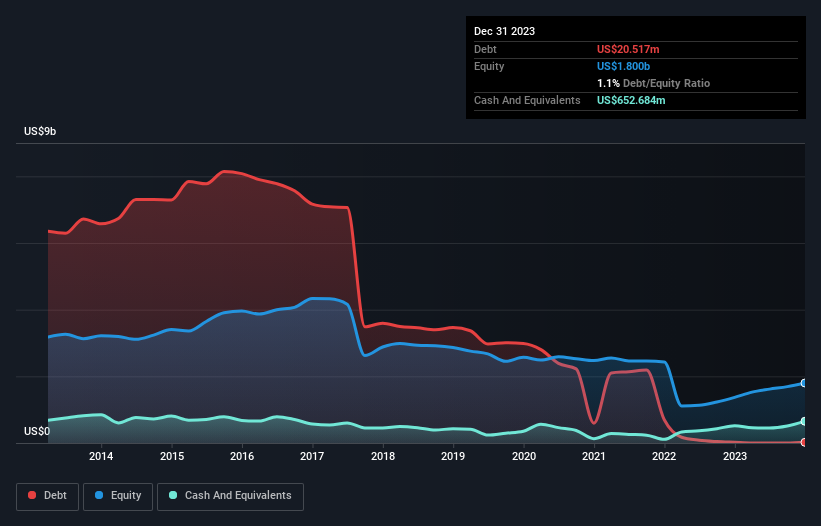Howard Marks put it nicely when he said that, rather than worrying about share price volatility, 'The possibility of permanent loss is the risk I worry about... and every practical investor I know worries about.' It's only natural to consider a company's balance sheet when you examine how risky it is, since debt is often involved when a business collapses. Importantly, Teekay Corporation (NYSE:TK) does carry debt. But the real question is whether this debt is making the company risky.
What Risk Does Debt Bring?
Generally speaking, debt only becomes a real problem when a company can't easily pay it off, either by raising capital or with its own cash flow. Part and parcel of capitalism is the process of 'creative destruction' where failed businesses are mercilessly liquidated by their bankers. However, a more common (but still painful) scenario is that it has to raise new equity capital at a low price, thus permanently diluting shareholders. Of course, debt can be an important tool in businesses, particularly capital heavy businesses. When we think about a company's use of debt, we first look at cash and debt together.
See our latest analysis for Teekay
What Is Teekay's Debt?
As you can see below, Teekay had US$20.5m of debt, at December 2023, which is about the same as the year before. You can click the chart for greater detail. However, it does have US$652.7m in cash offsetting this, leading to net cash of US$632.2m.

How Healthy Is Teekay's Balance Sheet?
The latest balance sheet data shows that Teekay had liabilities of US$136.9m due within a year, and liabilities of US$259.4m falling due after that. Offsetting these obligations, it had cash of US$652.7m as well as receivables valued at US$203.4m due within 12 months. So it actually has US$459.8m more liquid assets than total liabilities.
This surplus liquidity suggests that Teekay's balance sheet could take a hit just as well as Homer Simpson's head can take a punch. With this in mind one could posit that its balance sheet means the company is able to handle some adversity. Simply put, the fact that Teekay has more cash than debt is arguably a good indication that it can manage its debt safely.
Even more impressive was the fact that Teekay grew its EBIT by 122% over twelve months. If maintained that growth will make the debt even more manageable in the years ahead. The balance sheet is clearly the area to focus on when you are analysing debt. But it is Teekay's earnings that will influence how the balance sheet holds up in the future. So when considering debt, it's definitely worth looking at the earnings trend. Click here for an interactive snapshot.
Finally, a company can only pay off debt with cold hard cash, not accounting profits. Teekay may have net cash on the balance sheet, but it is still interesting to look at how well the business converts its earnings before interest and tax (EBIT) to free cash flow, because that will influence both its need for, and its capacity to manage debt. Over the last two years, Teekay actually produced more free cash flow than EBIT. That sort of strong cash conversion gets us as excited as the crowd when the beat drops at a Daft Punk concert.
Summing Up
While it is always sensible to investigate a company's debt, in this case Teekay has US$632.2m in net cash and a decent-looking balance sheet. The cherry on top was that in converted 106% of that EBIT to free cash flow, bringing in US$623m. The bottom line is that Teekay's use of debt is absolutely fine. Over time, share prices tend to follow earnings per share, so if you're interested in Teekay, you may well want to click here to check an interactive graph of its earnings per share history.
At the end of the day, it's often better to focus on companies that are free from net debt. You can access our special list of such companies (all with a track record of profit growth). It's free.
Valuation is complex, but we're here to simplify it.
Discover if Teekay might be undervalued or overvalued with our detailed analysis, featuring fair value estimates, potential risks, dividends, insider trades, and its financial condition.
Access Free AnalysisHave feedback on this article? Concerned about the content? Get in touch with us directly. Alternatively, email editorial-team (at) simplywallst.com.
This article by Simply Wall St is general in nature. We provide commentary based on historical data and analyst forecasts only using an unbiased methodology and our articles are not intended to be financial advice. It does not constitute a recommendation to buy or sell any stock, and does not take account of your objectives, or your financial situation. We aim to bring you long-term focused analysis driven by fundamental data. Note that our analysis may not factor in the latest price-sensitive company announcements or qualitative material. Simply Wall St has no position in any stocks mentioned.
About NYSE:TK
Teekay
Provides crude oil marine transportation and other marine services worldwide.
Flawless balance sheet and good value.
Similar Companies
Market Insights
Community Narratives



